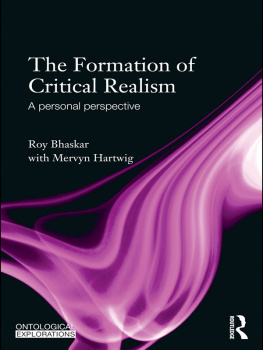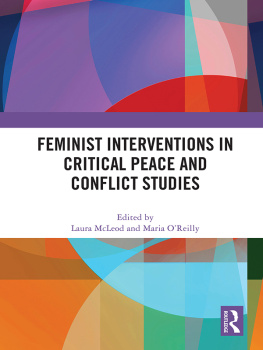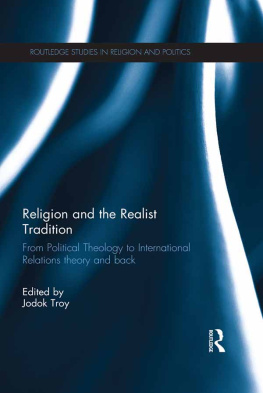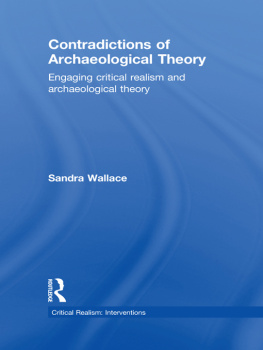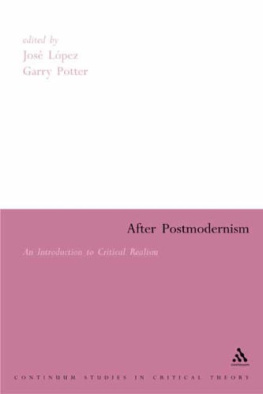
The Contradictions of Love
The Contradictions of Love: Towards a feminist-realist ontology of sociosexuality offers a robust and multifaceted theoretical account of why and how, in contemporary western societies, women continue to be subordinated to men in and through sexual love. The book defends and elaborates Anna G. Jnasdttirs thesis that men tend to exploit women of their love power, by means of an innovative application of critical realism, dialectical critical realism and the philosophy of metaReality. Gunnarsson also offers a critique of the state of affairs of contemporary feminist theory, demonstrating that the meta-theoretical framework of critical realism offers the tools that can counter the poststructuralist hegemony still prevailing in feminist theory. On a general level, The Contradictions of Love attempts at reconciling theoretical positions which tend to appear in opposition to one another. In particular, it offers a way of bridging the gap between the notion of love as a locus of exploitation and that of love as a force which can conquer oppression.
This book is a unique and timely contribution in the field of feminist theory, in that it offers the first elaborate assessment and development of Jnasdttirs important but relatively neglected work, and in that it counters poststructuralist trends from the point of view of a robust critical realist framework that has hitherto been spectacularly absent in feminist theory, although it offers solutions to meta-theoretical problems at the forefront of feminist debates; in the field of critical realism broadly defined, in that it elaborates on crucial ontological themes of (dialectical) critical realism and the philosophy of metaReality via a discussion of the issues of love, sexuality, gender and power; and finally, in the field of love studies, in that it offers a sophisticated account of how gender asymmetries prevail in love despite norms of gender equality and reciprocity, and in that it reconciles feminist, conflict-oriented perspectives on love with notions of love as transcending conflict.
Lena Gunnarsson is a Researcher at rebro University, Sweden.
Ontological Explorations
Other titles in this series:
From One Empire to the Next
Radha DSouza
Science for Humanism
The recovery of human agency
Charles R. Varela
Philosophical Problems of Sustainability
Taking sustainability forward with a critical realist approach
Jenneth Parker
Dialectic and Difference
Dialectical critical realism and the grounds of justice
Alan Norrie
Interdisciplinarity and Climate Change
Transforming knowledge and practice for our global future
Edited by Roy Bhaskar, Cheryl Frank, Karl Georg Hyer, Petter Naess and Jenneth Parker
Conversations about Reflexivity
Edited by Margaret S. Archer
Relational Sociology
A new paradigm for the social sciences
Pierpaolo Donati
Sociological Realism
Edited by Andrea M. Maccarini, Emmanuele Morandi and Riccardo Prandini
The Economics of Science: A Critical Realist Overview
Volume 1: Illustrations and philosophical preliminaries
David Tyfield
The Economics of Science: A Critical Realist Overview
Volume 2: Towards a synthesis of political economy and science and technology studies
David Tyfield
Ontology Revisited
Metaphysics in social and political philosophy
Ruth Groff
Childhoods, Real and Imagined
Volume 1: An introduction to critical realism and childhood studies
Priscilla Alderson
Naturalizing Critical Realist Social Ontology
Tuukka Kaidesoja
Whats Critical about Critical Realism? Essays in Reconstructive Social Theory
Frederic Vandenberghe
Integrating Knowledge through Interdisciplinary Research
Problems of theory and practice
Dominic Holland
The Contradictions of Love
Towards a feminist-realist ontology of sociosexuality
Lena Gunnarsson
The Contradictions of Love
Towards a feminist-realist ontology of sociosexuality
Lena Gunnarsson
First published 2014
by Routledge
2 Park Square, Milton Park, Abingdon, Oxon, OX14 4RN
and by Routledge
711 Third Avenue, New York, NY 10017
Routledge is an imprint of the Taylor & Francis Group, an informa business
2014 Lena Gunnarsson
The right of Lena Gunnarsson to be identified as author of this work has been asserted in accordance with sections 77 and 78 of the Copyright, Designs and Patents Act 1988.
All rights reserved. No part of this book may be reprinted, reproduced or utilised in any form or by any electronic, mechanical, or other means, now known or hereafter invented, including photocopying and recording, or in any information storage or retrieval system, without permission in writing from the publishers.
Trademark notice: Product or corporate names may be trademarks or registered trademarks, and are used only for identification and explanation without intent to infringe.
British Library Cataloguing in Publication Data
A catalogue record for this book is available from the British Library
Library of Congress Cataloging-in-Publication Data
A catalog record has been requested for this book
ISBN: 978-0-415-82411-8 (hbk)
ISBN: 978-1-315-85146-4 (ebk)
Typeset in Times New Roman by
Cenveo Publisher Services
For Vide and Ask
Contents
PART I
Feminist modes of theorizing sexuality and gendered power
PART II
Meta-theoretical interlude: Challenging poststructuralist feminism
PART III
The reality of love and power: A feminist-realist depth approach
I want to thank the following people for invaluable support in the process of completing this book, which is a slightly revised version of my doctoral thesis in Gender Studies, defended at rebro University, Sweden.
First, thank you Anna Jnasdttir for breaking so many intellectual taboos, paving the way for my own courage to challenge poststructuralist truths that I once felt were unchallengeable. Thank you also for guiding me with your passion, stubbornness and rigour through the process of writing the thesis. Thank you also Liisa Husu, my main supervisor during the last years of writing. Your professionalism and practical efficiency have been especially rewarding.
Many thanks to Andrew Sayer, faculty examiner at my doctoral defence, for so warmly yet mercilessly challenging some elements of the thesis in a way that impelled me to solidify my argumentation. Thank you also for taking the time to detail your advice on how to improve the manuscript for publication. Thank you also Valerie Bryson, for offering me your stringent and responsible critique of an earlier draft of this book. Your ability to rigorously assess my text on its own terms was invaluable.
Warm thanks to the whole Gender Studies team at rebro University Tobias Axelsson, Ida Maria Brjesson, Jeff Hearn, Liisa Husu, Anna Jnasdttir, Gunnel Karlsson, Helena Magnusson, Ingrid Pincus, Moa Roshanfar, Sofia Strid and Berit berg. It is no exaggeration to say that you are one of the anchors in my life. Thank you for offering a milieu that knows the true meaning of the term constructive critique and, above all, for being such great friends. Thank you also Anna-Lisa Fransson for enlightening many a coffee break with your always enlivening presence.


